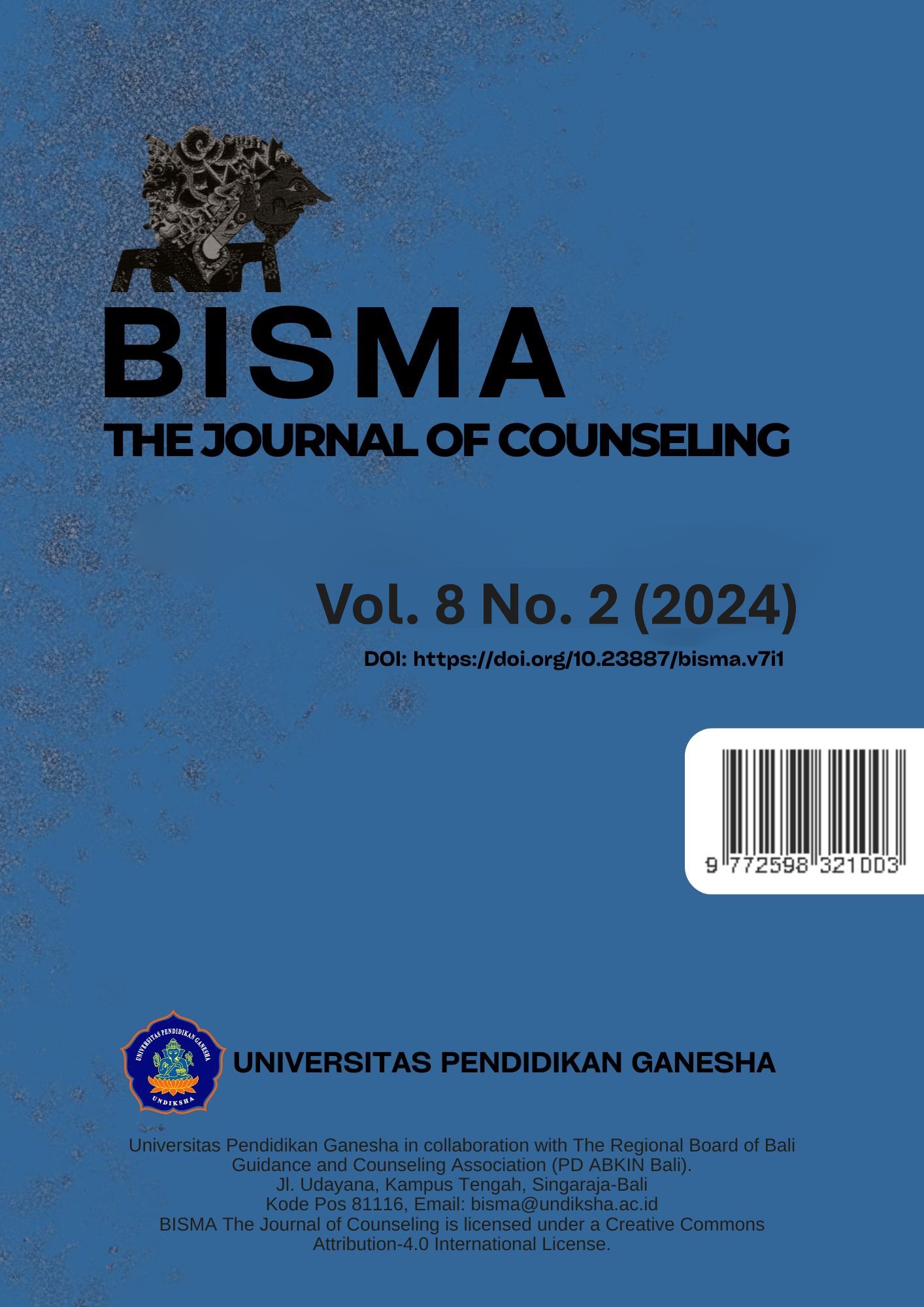Knowledge and Attitude Towards Assessment and Testing Among School and Other Practising Counsellors in Nigeria
DOI:
https://doi.org/10.23887/bisma.v8i2.89923Keywords:
Knowledge, Attitude, Assessment, Testing, CounsellorsAbstract
This study addressed the problem of limited knowledge and varying attitudes towards assessment and testing among school and practicing counsellors in Nigeria. The research aimed to explore the relationships between knowledge and attitudes towards these practices. Using four research questions and hypotheses, the study targeted all counsellors in Nigeria, with a purposive random sample of 350 participants drawn from attendees at the annual APROCON and CASSON conferences. Data were collected through the "Knowledge and Attitude towards Assessment and Testing among School and Practicing Counsellors in Nigeria Scale (KAATSOPCNS)," developed after an extensive literature review. Analysis was conducted using Pearson Product Moment Correlation Coefficient (PPMCC). The findings revealed significant relationships between counsellors' knowledge and attitudes towards assessment and testing, emphasizing the need for deeper understanding and professional competence. It is recommended that counsellors acquire requisite qualifications, gain practical experience, and participate in regular professional development programs to enhance their proficiency in assessment and testing. These steps are essential to ensure effective counselling practices in Nigeria.
References
Anthony, M. M., & Rowa, K. (2005). Evidence –based assessment of anxiety disorders in adults. Psychological Assessment, 17(3), 256–266. https://doi.org/10.1037/1040-3590.17.3.256.
Bathgate, M., & Schunn, C. (2017). The psychological characteristics of experiences that influence science motivation and content knowledge. International Journal of Science Education, 39(17), 2402–2432. https://doi.org/10.1080/09500693.2017.1386807.
Brookhart, S., & M, B. S. (2013). Comprehensive assessment systems in service of learning. Informing the practice of teaching using formative and interim assessment. A System Approach, 45(5), 165–184.
Butcher, J. N. (2010). Personality assessment from the nineteenth to the early twenty-first century: Past achievements and contemporary challenges. Annual Review of Clinical Psychology, 6(1), 1–20. https://doi.org/10.1146/annurev.clinpsy.121208.131420.
Cohen, R. J., & Swerdlik, M. E. (2005). Psychological testing and assessment: An introduction to tests and measurement (6th ed.). McGraw Hill.
De Brabander, C. J., & Glastra, F. J. (2018). Testing a unified model of task-specific motivation: How teachers appraise three professional development activities. Frontline Learning Research, 6(1), 54–76. https://doi.org/10.14786/flr.v6i1.342.
Ekstrom, R. B., Elmore, P. B., Schafer, W. D., Trotter, T. V, & Webster, B. (2004). A survey of assessment and evaluation activities of school counsellors. Professional School Counselling, 8(1), 24–30. https://www.jstor.org/stable/42732411.
Epperson, D. L., Bushway, D. J., & Warman, R. E. (1983). Client self-termination after one counselling session: Effects of problem recognition, counsellor gender, and counsellor experience. Journal of Counselling Psychology, 30(3), 307–315. https://doi.org/10.1037/0022-0167.30.3.307.
Flanagan, R., & Esquivel, G. B. (2006). Empirical and clinical methods in the assessment of personality and psychopathology: An integrative approach for training. Psychology in the Schools, 43(4), 513–526. https://doi.org/10.1002/pits.20165.
Heilbrun, K., DeMatteo, D., Marczyk, G., & Goldstein, A. (2008). Standards of practice and care in forensic mental health assessment: Legal, professional and principles-based consideration. Psychology, Public Policy and Law, 14(1), 1–26. https://doi.org/10.1037/1076-8971.14.1.1.
Jansen, T., & Moller, J. (2022). Teacher’s judgements in school exams: Influences of students’ lower-order-thinking skills on the asseussment of students’ higher-order-thinking. Teaching and Teachers Education, 111, 103616. https://doi.org/10.1016/j.tate.2021.103616.
Koch, L. C. (2000). Assessment and planning in the Americans with Disabilities Act era: Strategies for consumer self-advocacy and employer collaboration. Journal of Vocational Rehabilitation, 14(2), 103–108. https://content.iospress.com/articles/journal-of-vocational-rehabilitation/jvr00071.
Liberto, A., Casula, L., & Pau, S. (2022). Grading practices, gender bias and educational outcomes: evidence from Italy. Education Economics, 30(5), 481–508. https://doi.org/10.1080/09645292.2021.2004999.
Mullen, P. R., Chae, N., Backer, A., & Niles, J. (2021). School counselor burnout, job stress, and job satisfaction by student caseload. Nassp Bulletin, 105(1), 25–42. https://doi.org/10.1177/0192636521999828.
Nenty, H., Adedoyin, O., Odili, J. N., & Major, T. (2021). Primary Teacher’s Perceptions Classroom Assessment Practices as Means of Providing Quality. International Journal of Educational Research and Reviews, 9(2), 001–008. https://eric.ed.gov/?id=EJ900110.
Papola, D., Miguel, C., Mazzaglia, M., Franco, P., Tedeschi, F., Romero, S. A., & Barbui, C. (2024). Psychotherapies for generalized anxiety disorder in adults: a systematic review and network meta-analysis of randomized clinical trials. JAMA Psychiatry, 81(3), 250–259. https://doi.org/10.1001/jamapsychiatry.2023.3971.
Rudy, H., & Levinson, E. (2008). Best practices in the multidisciplinary assessment of emotional disturbances: A primer for counsellors. Journal of Counselling & Development, 86(4), 494–504. https://doi.org/10.1002/j.1556-6678.2008.tb00537.x.
Sattler, J. M. (2002). Assessment of children: behavioural and clinical application (4th ed.). Sattler.
Snyder, D. K., Heyman, R. E., & Haynes, S. N. (2005). Evidence-based approaches to assessing couples in distress. Psychological Assessment, 17(3), 228–307. https://doi.org/10.1037/1040-3590.17.3.288.
Whiston, S. C. (2009). Principles and application of assessments in counselling (3rd ed.). Brooks/Cole.
Widiger, T. A., & Samuel, D. B. (2009). Evidence-based assessment of personality disorders. Psychological Assessment, 17, 278–287.
Young, L. U. (2017). The role of guidance counsellors in the career in the career development of adolescent and young adult with special needs. British Journal of Arts and Social Sciences, 2(1), 51–62.
Zaliyaperumal, K. (2004). Guidelines for Conducting a Knowledge, attitude and practicing (ICAP) study. Associationof Executive Search Consultants Illumination.
Downloads
Published
Issue
Section
License
Copyright (c) 2024 Obaze Agbonluae Osumah, B. O. Ehigbor, Edowaye Osemeikhian

This work is licensed under a Creative Commons Attribution 4.0 International License.








